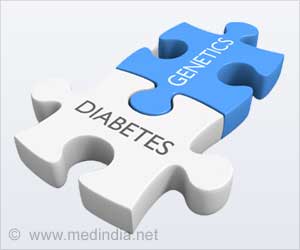Type 2 diabetes has strong hereditary tendencies. The genes we are born with cannot be changed.

Epigenetic changes are usually described as a link between heredity and environment, and come about as a result of factors such as ageing, chemicals, medication, diet, exercise and drugs.
Researchers have now demonstrated that half of the known genetic risk variants for type 2 diabetes can be influenced by epigenetic changes that in turn influence the function of the insulin-producing cells.
"This means that we gain a tool to influence the function of the risk genes, improve insulin release and thereby reduce the risk of diabetes", Charlotte Ling at Lund University Diabetes Centre said.
The epigenetic factor that has been studied is a chemical change on the DNA strand following a certain pattern, known as DNA methylation.
"We have shown that 19 of 40 known genetic risk variants for type 2 diabetes are affected by DNA methylation, which in turn changes the function of the insulin-producing cells", Ling said.
Advertisement
"The next step is to find this out and after this study of the genetic risk variants, we can say that in some cases the increased risk is probably due to varying degrees of DNA methylation," she said.
Advertisement
This is the first epigenetic study to be carried out on the 40 risk markers for type 2 diabetes.
The present study shows that DNA methylation of genetic risk variants for diabetes influence the insulin-producing cells in various different ways, such as the amount of insulin they contain and the amount they are able to release into the blood stream.
The study has been published in the scientific journal Diabetologia.
Source-ANI












